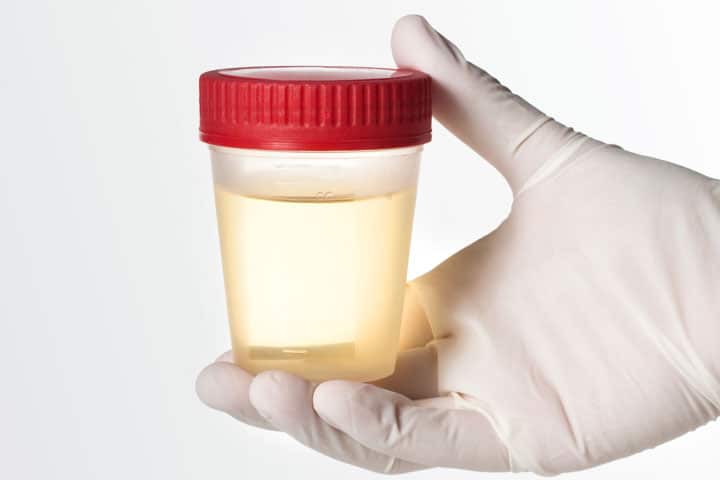
What is the BRAF test?
Cancer happens as a result of a number of mutations in a cell. Sometimes there can be completely different genes mutated in different animals with the same tumour. In TCC however, a mutation in a protein called BRAF is very common, occurring in 85% of dogs with this cancer. Importantly for the test, it is present both in early and late stages and not in normal cells. Also crucial is that the cancer cells are shed into the urine. Often, this can mean the diagnosis can be made using urine cytology alone, but often the quantity of cells is not quite enough to make a firm diagnosis.
The mutation can be detected in the urine using fluorescent dyes which bind to either the wild type (non-mutated) gene or the mutated BRAF protein. The levels of dye present can then be used to determine the presence of TCC.
How good is the test?
In short, it is very good. The sensitivity is 85% (meaning that 15% of cancer cases will be missed) and the specificity is over 99% (meaning that less than 1% of cases will be wrongly diagnosed with the tumour). The test is not affected by blood or bacteria in the urine.
The test can also detect tiny numbers of cancer cells so can be used to screen at risk breeds with lower urinary tract signs, which might otherwise be treated symptomatically.
How do I do it?
The test is run on 5-10ml of urine, which can be obtained as a free catch sample.
When to use it?
The test means that TCC can be reliably diagnosed in a very non-invasive way. The limiting factor on the test so far for us in the clinic is roughly 10 days to 2 weeks turnaround time, however, the test is excellent for several purposes:
- Diagnosing TCC in dogs with moderate urinary clinical signs, where signs can be controlled with an NSAID whilst waiting for the results.
- Diagnosing TCC in dogs with more severe signs where more rapid methods (urine cytology or cytology from traumatic catheterisation) have not yielded a diagnosis, or the owner doesn’t want to pursue more invasive diagnostics.
- An early diagnosis of TCC in at risk breeds over 6 years old with mild clinical signs. TCC is unlikely in dogs under 6.
At Risks Breeds

What next?
What the test doesn’t tell us is where in the bladder the tumour is and whether there are any metastases. Knowing this will affect which treatment options we can recommend (surgery, chemotherapy, radiotherapy etc.) and also allow us to prognosticate with greater accuracy. For the owner that wouldn’t consider surgery or radiotherapy, chemotherapy can be used regardless of the location of the tumour and as long as there are no other contraindications, NSAIDs are also a great treatment choice.
If you have any questions about the test or the best management of an animal with urinary tract signs or a diagnosis of TCC, we are happy to help. Our clinicians can answer emailed advice requests and we can accept referrals at any stage along the path from first presentation to discussing treatment options after first-line therapies have failed.
Case Advice or Arranging a Referral
If you are a veterinary professional and would like to discuss a case with one of our team, or require pre-referral advice about a patient, please call 01883 741449. Alternatively, to refer a case, please use the online referral form
About The Discipline
Oncology

Need case advice or have any questions?
If you have any questions or would like advice on a case please call our dedicated vet line on 01883 741449 and ask to speak to one of our Oncology team.
Advice is freely available, even if the case cannot be referred.
Oncology Team
Our Oncology Team offer a caring, multi-disciplinary approach to all medical and surgical conditions.